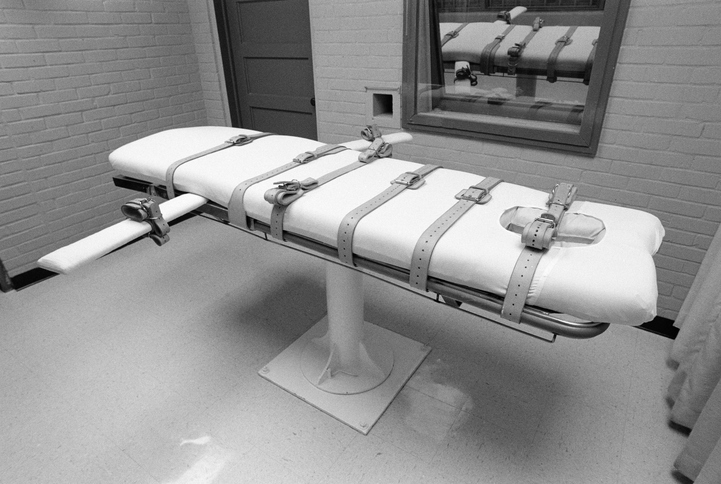-
 play_arrow
play_arrow
Foxy 106.9
-
 play_arrow
play_arrow
Dr. Candice Carter-Oliver Interview
Days Before Marcellus ‘Khaliifah’ Williams Was Executed, Another Likely Innocent Black Man Was Too

Source: Bernd Obermann / Getty
On Sept. 20, four days before the state-sanctioned killing of Khaliifah ibn Rayford Daniels ‘Abdul-Qudduus, a Black man from South Carolina who was also likely innocent, was executed by lethal injection. His name was Khalil Divine Black Sun Allah–previously known as Freddie Owens.
Do you see what’s happening here? There seems to be a renewed doubling down on executing Black men in America whose guilt is not just in reasonable doubt, but in entirely real doubt. We must say their names. We must take action.
Murder, Terror and Betrayal
On Nov. 1, 1997, Irene Graves, a 41-year-old mother of three, was working as the cashier at the Speedway Market in Greenville, South Carolina, when two armed, masked men entered the store and demanded all the money from the register and the safe.
Graves…gave the masked men $37.29 from the register, but when she told them she didn’t know the combination to the store’s safe, Owens shot her in the head, court documents allege.
The documents reflect a lie told by one of those two men, Steven Golden, who was arrested later that month and told police that Allah was the person who shot Graves in the head, killing her. It couldn’t be confirmed on the store’s video footage, but it couldn’t be ruled out either. Golden was given a plea deal and sentenced to 28 years. Allah was sentenced to death. He maintained his innocence for the remainder of his life, which he lost last week at age 46.
Two days before that, on Sept. 18, Golden finally admitted Allah was “not present” at the robbery-murder, and provided a sworn statement saying so, the Guardian reported. “I don’t want [Allah] to be executed for something he didn’t do,” Golden penned in his affidavit.
And like Khaliifah, Allah’s DNA was also absent from the crime scene.
The interrogation and the aftermath
Golden told the Court that he was under the influence when police questioned him days after the robbery, and detectives insisted they were aware that Allah had been with him. “They told me I might as well make a statement against [Allah], because he already told his side to everyone and they were just trying to get my side of the story. I was scared that I would get the death penalty if I didn’t make a statement.”
But he was also scared of the “real shooter,” Golden said in his sworn statement, which is why, he said, he both took a plea that spared him the death penalty–he was sentenced to 28 years–but also made him conceal the identity of the “real shooter” who killed the cherished mom of three.
As Allah’s execution approached, his lawyers tirelessly filed emergency motions to postpone his execution, but the State’s Supreme Court denied their requests. They didn’t even disregarded a critical piece of information: Golden admitted there was “a verbal agreement” with the officers who arrested him that he would not face the death penalty in exchange for testifying against Allah. Golden claimed prosecutors directed him to mislead jurors about any agreements concerning his sentence.
Furthermore, a 1999 document supported Golden’s assertions; his attorney at the time drafted a plea agreement that clearly stated he would be spared the death penalty. That document was never introduced as evidence during the trial.
Last week, Henry McMaster, South Carolina’s staunch Republican governor, had the authority to intervene but tragically let Allah–and justice–down by announcing he would not grant clemency.
Why wasn’t Golden’s testimony carefully examined, and why was Allah’s execution expedited without considering any of his statements? Once again, why was no DNA evidence taken into account?
I won’t share into the terrible, distressing details of Allah’s execution, as other news outlets have. I will share that the 46-year-old smiled at his lawyer, Emily Paavola, as he received a single dose of the sedative pentobarbital—the first time South Carolina employed this method instead of the previous three-drug cocktail.
I will share that reports from the Associated Press indicated it took Allah longer than expected to stop breathing after the drug began flowing–approximately six minutes as compared to the two or three minutes typically observed during the administration three-drug killer cocktail.
It’s all too familiar…
South Carolina was once a central hub for the Transatlantic Slave Trade. In Charleston, nearly 150,000 kidnapped Africans—over 40% of those trafficked to North America—arrived through the harbor, as noted by the Equal Justice Initiative. Tragically, about one-third of those enslaved Africans perished within a year of their arrival.
Enslaved individuals were forced to work in hazardous conditions on rice plantations, with African women playing a vital role in transferring rice cultivation practices to the region. Others endured brutal labor picking Sea Island cotton or were “hired out” for grueling tasks, facing horrific consequences, including lynching and torture, if they failed to meet demands.
This harrowing legacy set the stage for centuries of unimaginable violence against Black people in South Carolina, exemplified by the tragic case of George Stinney Jr., whose murder I included in yesterday’s story about Imam Khaliifah. At just 14 years old, weighing only 90 pounds, he became the youngest person executed in the U.S. in the last century, convicted by an all-white jury after 10 minutes of deliberation for the murders of two young white girls. They had to seat him on two Bibles in order to get him to fit in the electric chair.
Hundreds of Black men have lost their lives to the death penalty in South Carolina.
Allah was the first person executed in South Carolina in 13 years, and the 285th person executed by the state since the practice was made official in 1912. His death underscores America’s troubling pattern of disproportionately targeting Black men for capital punishment. According to Department of Corrections data, 74% of those executed in South Carolina since 1912 were Black, while only 26% were white.
With family in South Carolina, I can’t help but reflect on how easily Allah could have been one of my own kin. He was sentenced to death amid so much of reasonable doubt. It makes me afraid for the men in my own family. Could they be wrongfully arrested, convicted–and then worse? Could yours?
Rob Lee, one of Allah’s lawyers, talked about his client’s life over all those years on death row–how he learned to read and write in Arabic as a testament to his Islamic faith; how like a true Southern gentleman, he called his mother, Dora Mason, every day to check on her. With such doubt about his guilt and with all Allah was doing to grow while in prison, why couldn’t a life sentence have been an alternative if being fully exonerated was not immediately on the table?
He was on such a path of rebirth and transformation, as his mother noted, emphasizing that he was “more than his conviction.” Just hours before his scheduled execution, Dora pleaded with state officials to stop the painful process, describing him as “a human being, a son, a brother, and a friend.”
She added, “He deserves compassion, understanding, and a fair chance at justice. Instead, the system has failed him and also the victim at every turn.”
SEE ALSO:
‘Be True To What You Said On Paper’: The Judicial System Continues To Fail Black America
The post Days Before Marcellus ‘Khaliifah’ Williams Was Executed, Another Likely Innocent Black Man Was Too appeared first on NewsOne.
The post Days Before Marcellus ‘Khaliifah’ Williams Was Executed, Another Likely Innocent Black Man Was Too appeared first on Black America Web.

-
4942 Delmar Blvd.
St. Louis, MO. 63108
CONTACT US
- 314-782-FOXY (3699) OFC
- 314-944-1069 REQUEST LINE
- [email protected]
- ADVERTISING INQUIRIES
- [email protected]
FOXY QR CODE


